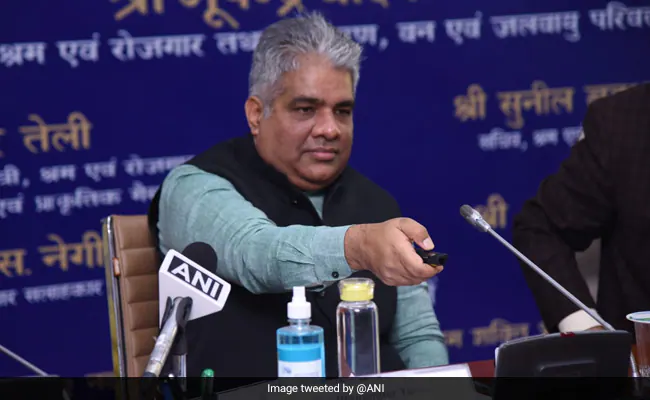Climate report fully supports India's view for developing nations: Centre
Environment Minister Bhupender Yadav welcomed the IPCC Working Group III report on 'Mitigation of Climate Change', which was released worldwide on Monday.

New Delhi: The latest IPCC report on mitigation of climate change justifies India's emphasis on equity at all scales in climate action and sustainable development, Union Environment Minister Bhupender Yadav said on Tuesday, stressing that it fully supports India's view on the necessity of public finance for developing countries.
Mr Yadav welcomed the IPCC Working Group III report on 'Mitigation of Climate Change', which was released worldwide on Monday, and said the report underlines the need for deep and urgent global emissions reduction.
"The IPCC report underlines the need for deep and urgent global emissions reduction and justifies India's emphasis on equity at all scales in climate action and sustainable development. We welcome it.
"The report also fully supports India's view on the necessity of public finance for developing countries and the need for scale, scope and speed in Climate Finance," he said during an event held here.
Mr Yadav said that the report notes that both cumulative and per capita annual emissions rose during the pre-2020 period.
"Pre-2020 emissions reduction in developed countries have been insufficient in comparison to the developing world's needs for sustainable development. Both historical cumulative emissions and per capita annual emissions show that India's role (as part of South Asia) is minimal," he said.
As per the IPCC report, global emissions can be halved by 2030 with major transitions in the energy sector, including a substantial reduction in fossil fuel use, highlighting that mitigation action needs to be taken now to limit global warming to 1.5 degrees Celsius.
The report mentions the carbon free and low carbon technologies available, as well as the potential of digitalization through robotics, artificial intelligence for supporting energy efficiency and renewable energy.
"IPCC reports are syntheses of peer reviewed research over the last several years. India's position on the historical responsibility of developed countries for consuming the carbon budget is scientifically established.
"The report underlines the need for deep and urgent global emissions reduction. Four-fifths of the total carbon budget for 1.5 degree C temperature increase and two-thirds of the total carbon budget for 2 degree C warming has been already consumed. 50 per cent of the global population, the vast majority in the developing world, is responsible for only 14 per cent of the global emissions," Mr Yadav said.
The report mentions that equity remains a central element in the UN climate regime, notwithstanding shifts in differentiation between states over time and challenges in assessing fair shares.
This finding is based on the report's assessment that with a shrinking remaining carbon budget, the access to a fair share of this budget for developing countries has become an important question, the minister said.
The report embodies that the changes in lifestyle and behaviours have a significant role to play in mitigating climate change.
"It endorses India's view on the need for curbing unsustainable consumption. India was instrumental in ensuring the inclusion of 'climate justice' and 'sustainable lifestyles and sustainable patterns of consumption and production' in the preamble of the Paris Agreement.
"Further, at COP26 in November 2021 at Glasgow, United Kingdom, as the implementation of the Paris Agreement began, India reaffirmed its commitment to climate actions, including the goal of net zero by 2070. Sustainable lifestyles underpin the survival of our planet. India believes that utilization of resources must be based on 'Mindful and Deliberate Utilization' and NOT 'Mindless and Destructive Consumption'. The Prime Minister gave a clarion call of L.I.F.E. - Lifestyles for Environment at COP26 at Glasgow," the minister noted.
The minister said that the report notes specifically that tracked financial flows fall short of the levels needed to achieve mitigation goals across all sectors and regions. The challenge of closing gaps is largest in developing countries as a whole.
"It also notes that public finance falls short of the Copenhagen goal of USD 100 billion per year by 2020. The report also endorses India's position on the need for scale, scope and speed in climate finance.
"It notes that accelerated financial support for developing countries from developed countries and other sources is a critical enabler to enhance mitigation action and address inequities in access to finance, including its costs, terms and conditions and economic vulnerability to climate change for developing countries," the environment minister said.
He reiterated that India firmly believes that climate change is a global collective action problem that can be solved only through international cooperation and multilateralism.
"India will continue to be the voice of ambition as well as the champion of equity on behalf of developing countries. India demonstrates this in specific, targeted actions, in specific suggestions and proposals and a firm faith in both science and human values.
"India walks the talk and speaks from a position of strength and responsibility on the subject of climate change. It is from this experience that India sends a message of hope and optimism that humanity and all nations can strive together and meet the challenge of climate change," he said.
Visit news.dtnext.in to explore our interactive epaper!
Download the DT Next app for more exciting features!
Click here for iOS
Click here for Android



